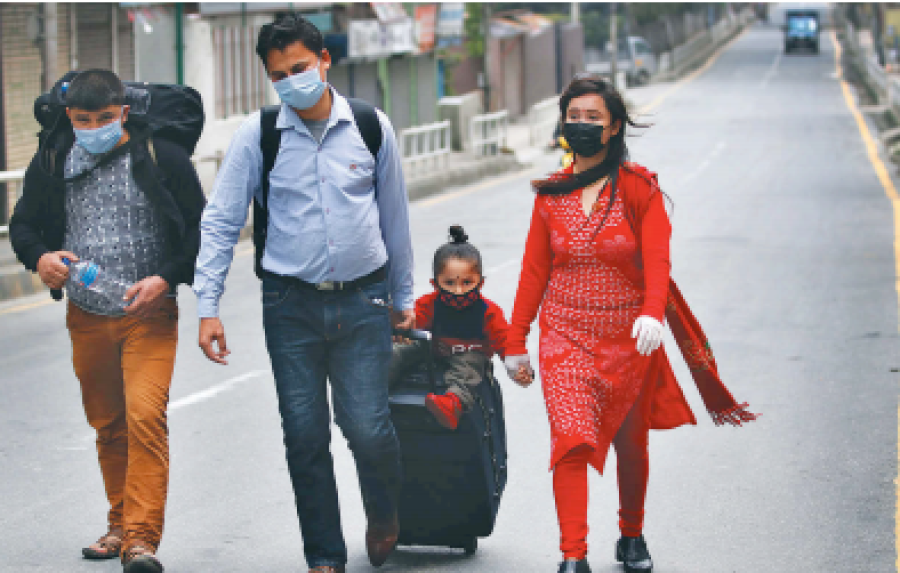National
Health Ministry recommends extending the lockdown by a week or allowing the provinces to decide on their own
But no matter what measures the government takes, Covid-19 is not going away any time soon, doctors say.
Arjun Poudel
More than a month into the nationwide lockdown imposed to limit the spread of Covid-19, tentative calls to lift the crippling restrictions on public movement have begun to emerge. Detractors, however, say that any relaxation in the lockdown at this time could dispel any small gains in the fight against the coronavirus.
The Health Ministry, taking both arguments into account, has proposed two options—either continue with the ongoing nationwide lockdown for at least a week or authorise the seven provincial governments to decide on their own individual measures to combat Covid-19.
Health Minister Bhanu Bhakta Dhakal floated the two proposals at a meeting of the high-level coordination committee to combat Covid-19 on Saturday, according to Dr Khem Karki, advisor to the minister.
“Our ideas are not final. They will be discussed thoroughly before an appropriate decision is taken,” Karki told the Post.
A task force led by Chief Secretary Lok Darshan Regmi has also recommended extending the lockdown by at least a week.
The task force has secretaries of various ministries and chiefs of security agencies.
As the current extension ends at midnight on April 27, the next meeting of the Cabinet, scheduled for Sunday, will decide on whether or not to extend the lockdown further.
“The Cabinet will decide whether to extend the lockdown depending on the situation in Nepal, India and different parts of the world,” Narayan Bidari, member-secretary of the high-level committee, told the Post.
According to Karki, Health Ministry officials believe that it would be counterproductive to lift the lockdown across the country all at once but also agreed that neither the economy nor many workers will be able to cope with the restrictions for long.
In order to provide the government with a metric to gauge the sectoral threat of Covid-19, the ministry has been carrying out risk assessment, demarcating the country into red, yellow and green zones, depending on the risk of a Covid-19 outbreak.
Hotspots where outbreaks have already occurred, like Bhulke in Udayapur, are considered red zones. Districts in the Tarai, especially districts of Provinces 1, 2, 5 and Sudurpaschim, are yellow zones, considered at high risk for a possible outbreak. Green zones are at low risk for the disease. Kathmandu is in the green zone, as all Covid-19 patients have recovered.
"We have been conducting such a demarcation since the beginning," Dr Gunaraj Lohani, chief of Policy, Planning, Monitoring and Evaluation at the Health Ministry, told the Post. "Decisions will be made as per the risk assessment. But nothing is predictable and Covid-19 is not likely to end in the near future.”
The Ministry of Health and Population expects sporadic cases of Covid-19 in various parts of the country for quite some time.
Mahendra Prasad Shrestha, director general of the Department of Health Services, said that global experience shows that a seven-week lockdown could break the chain of the spread of the virus. But even if the lockdown continues, it will be on a different modality, said Shrestha. Both domestic and international travel will be restricted, while schools, cinemas, malls, public gatherings and mass transportation will remain closed. But factories, offices and farms will be allowed to continue work while maintaining proper preventive measures.
"Due to the restrictive measures the government has enforced, we have been able to limit cases of Covid-19 to double digits," Shrestha said. "We are working to keep that number steady as we are well aware that we cannot handle a mass outbreak like in Europe or America.”
Despite any measures that the government adopts, coronavirus infections are likely to continue across the country, albeit in small numbers. It is unlikely that Covid-19 will go away any time soon, said Dr Roshan Pokhrel, chief specialist at the Health Ministry.
"We have to accept that we are living in a pandemic,” said Pokhrel. “Life will not be the same.”




 9.7°C Kathmandu
9.7°C Kathmandu














